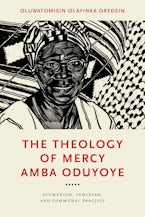Oduyoye’s remedy to injustice is inclusivity and liberation. African women theologians as a whole purport the same ideology. In anchoring itself in inclusive approaches to social and ecclesial life, African women’s theology asserts that African women deserve to be co-determiners of cultural ideas and ecclesial values. But it has only had this impact because of Oduyoye’s acumen. She has, over the course of numerous decades, fought against antiquated and injurious ideas about Africans, about women, and about those who occupy both of these identities and more.
At best, this book only offers a glimpse of how feminism, Christian theology, and African studies fit and connect within Oduyoye’s story and the women who find solace in it. Through interrogating African women’s interpretations of feminism, she challenges those of us with feminist leanings to broaden our scope of inclusion and understanding. In addressing the pernicious effects of colonialism on the message and practice of Christianity in West Africa, she challenges those of us who assume we have a grasp on Christian theology to remember and tell its entire history—good and bad. Forgetting is a privilege only Europeans can seem to afford. Oduyoye challenges those who think themselves familiar with African studies to honor women and other marginalized persons by interrogating how religious life has had a hand in determining the social life of many African peoples.
Oduyoye does feminism, Christian theology, and African culture a service by identifying their deficiencies. She does not leave them in a state of disarray, however. Instead, her life gestures towards their constructive possibilities. Feminism, Christian theology, and African culture are all places of promise, but each area must seriously listen to and include those who live at the intersection of each. African women theologians have a world of wealth to offer the worlds from which they come; but these worlds must be open to understanding not only their shortcomings, but also their own strengths. These worlds must listen to their marginalized.
Oduyoye finds a way to make feminism, Christian theology, and aspects of African culture her own; she crafts them into a religious position. African women’s theology rattles the seemingly solid foundations of feminism, Christian theology, and African culture—cracking them open to reveal hollow bases. If void of African women’s contributions these areas are bound to crumble in upon themselves. But when they are included, African women reveal the richness of these areas of life and interrogation. They rightfully consider feminism, Christian theology, and African culture critical parts of their identity—African women’s theology claims African women’s experience is women’s experience, is Christian experience, is African experience—is human experience.
Oduyoye’s work nuances the stories the world assumes it already knows and of which it errantly speaks on behalf. Her presence within Christian theology is her refusal for this reality to continue to be true; by virtue of being present in theological and ecumenical conversations and events, she has not and does not allow African women’s agency to be wrested from them. Her work wonders, “What challenges does the Third World pose to Christian theology and Christian witness to the Gospel of Jesus Christ?” And further, “What challenges do women within the Third World face within their own contexts?” These wonderings, in turn, draw the reader’s attention to their own theological locales in relation to the conceived, contrived, and perceived theological locations of others.
Oduyoye forces us to grapple with where we are theologically located. Her message is clear: we who think our lives unaffected by the factors that impact African women are unable to see not only the truth of African women’s lives, but also primarily the truth of our own lives. African women’s theology calls African culture to account: abandoning its women reflects an abandonment of African culture’s greatest virtues. It also, however, debunks the falsehood that Western religious imagination is the most prominent voice within Christian thought. It proves untrue the notion that theologies are not impacted by the culture of another. It forces the West to recognize where it exercises colonial privilege and advantage within its own theological house. How the West “reads” Oduyoye should have a reflective effect. What is she showing the Western reader about their theological imagination, their theological abusua, their theological priorities? The burden of Western interpretation rests on the Western reader, especially if they are not accustomed to seeing African women a critical part of theological processes and conversations.
Oduyoye’s work then, through African women’s theology, restores African women’s agency on many fronts. In utilizing African feminist, liberationist, and systematic theological registers, Oduyoye’s theological and ecumenical work frees African women up to be their truest theological selves. In this, she firmly places African women in the center of many theological conversations. Oduyoye has, in many ways, become “all things to all people;” her work traverses the thematic landscapes of African feminism, liberation, and systematics, and is precisely what Christian theology needs. Those within dominant communities learn from Oduyoye’s work how important women who identify as African and Christian are to the universal theological landscape.





